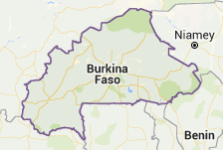MOGADISHU — In a historic stop in Somalia, Secretary of State John F. Kerry promised Tuesday that U.S. diplomats will return after a nearly 25-year absence and praised efforts to restore control over the country’s “ungoverned” regions used as havens for militants.
The nearly four-hour visit marked the first time a serving American secretary of state has visited the Horn of Africa nation, which has been wracked by civil war and radical factions for decades.
“We all have a stake in your success,” Kerry said in a video message before departing Mogadishu. “The world cannot afford to have places on the map that are essentially ungoverned. That is why Somalia’s return to effective government is an historic opportunity.”
The United States closed its diplomatic mission in Somalia in 1991. But for many Americans, a lingering image of Somalia is the 1993 downing of two Black Hawk helicopters by militiamen. The crashes and ensuing battles left 18 military personnel dead.
Kerry said there is “no fixed timetable” to reopen the U.S. Embassy, but he said Washington will “begin the process of establishing the premises for a diplomatic mission in Mogadishu.”
The stop underscored American solidarity with the Somali government as it tries to fight militants allied to al-Qaeda and other Islamic groups and cope with hundreds of thousands of refugees fleeing the country.
Kerry held meetings in a one-story building at the airport surrounded by seven-foot walls of sandbags. Somalia’s embattled government only found out very recently that Kerry was due to visit.
Top of the agenda was the government’s fight against al-Shabab militants, whose recent attacks included the storming of a university in neighboring Kenya last month that left 147 people dead.
“The next time I come, we have to be able to just walk downtown,” Kerry told the Somali leaders after arriving, adding he was glad to be in the Somali capital, Mogadishu.
Somali’s President Hassan Sheikh Mohamoud told Kerry that Mogadishu “is very different now than it was two years ago.”
“The roads are less bumpy and we have traffic jams,” he told Kerry.
Kerry joked that traffic jams were good and meant the country was “getting normal.”
“Step by step,” the American secretary of state said.
The stop came one day after Kerry said the United States will provide an extra $45 million for the United Nations to help an overwhelmed Kenya cope with 600,000 refugees fleeing civil unrest, terrorism and violence in both Somalia and South Sudan.
After meeting with Kenyan President Uhuru Kenyatta, Kerry said he was confident that Kenya would not close the world’s largest refugee camp, now home to 350,000 Somalis. The government had threatened to dismantle the Dadaab camp complex — consisting of five camps near the border with Somalia — because it suspects that the militant group al-Shabab has planned attacks from the camp, including one last month at Garissa University College.
Authorities have provided no evidence to support that claim.
The United States has opposed dismantling the camps, which could leave many refugees with little choice but to return to the dangerous conditions they fled.
Only a small fraction of the camp’s refugees have agreed to return through a U.N. voluntary repatriation program. The United Nations set up the first camps at Dadaab in 1991, and many who live in the sprawling complex are teenagers and children who have never been to the countries their parents fled.
Kenyatta “made clear Kenya has a great tradition of hosting refugees, and that the key is to accelerate efforts to have a plan in place for the ability of the people in not just Dadaab but in all the refugee camps to be able to return home, in an orderly and voluntary manner, with dignity and with safety,” Kerry said. “That’s his goal. That’s our goal.”
The funding announced Monday brings Washington’s refugee aid to Kenya to $289 million in the past two years. The U.S. military footprint in the region is growing, too, with drone strikes against al-Shabab in Somalia , largely from a military hub in Djibouti that Kerry will visit later in the week. This year, he said, the United States will spend $100 million on anti-terrorism efforts in Kenya.
Speaking at a news conference after a day of meetings with government officials and opposition figures, Kerry also said that the United States would commit $5 million to finance a court in South Sudan “to hold perpetrators of violence to account.” He blamed the war raging there since 2013 on a lack of leadership, and he urged President Salva Kiir and opposition leader Riek Machar to “silence the guns.”
Kerry’s trip to Kenya, the first by a senior U.S. official since 2012,effectively ends a year of estrangement between Washington and Nairobi after the International Criminal Court charged Kenyatta with crimes against humanity over post-election violence in 2007 and 2008. The charges were dropped late last year.
Kerry also paid an emotional visit to the site of the 1998 bombing of the U.S. Embassy in Nairobi. As dozens of survivors and their families watched, he laid a wreath in front of a granite memorial wall bearing the names of the 218 people who died when suicide bombers detonated a truck in front of the embassy.





